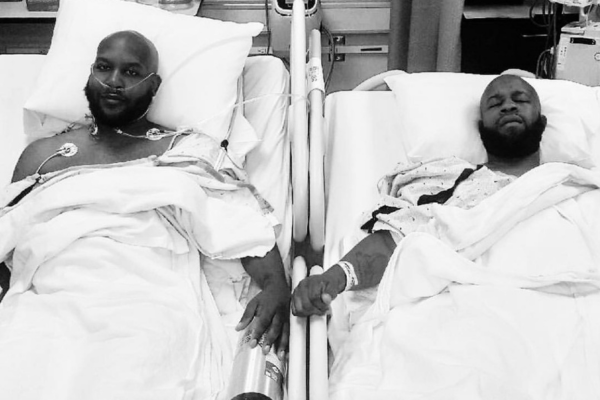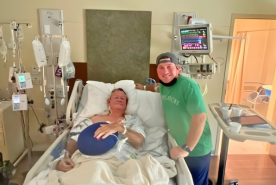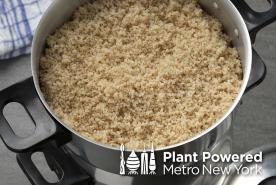March 05, 2024
Four-time Grammy winner Brian Kennedy knows a lot about writing and producing chart-topping hits. What he did not know was that his kidneys were quietly shutting down while his music career was rapidly taking off.
After spending seven years on the transplant waitlist, his brother donated a kidney to him.
Now Kennedy uses his second chance at life to raise awareness about kidney disease risk factors and to fight healthcare inequalities.
This is his story.
The Path to Fame
Kennedy’s musical journey began in the late 80s when he was just four.
“My auntie let me play her piano. I loved it. I learned how to play by ear. I was lucky to be supported from such a young age.” Kennedy said, "I joined a choir and got accepted into a Musical Arts High School. After finishing school, I moved to LA to work as a studio musician."
Kennedy quickly moved up the hierarchy, working with some of the most esteemed hip-hop artists and producers in the decade, including Timbaland, Dr. Dre, and Babyface. Kennedy played along with these greats and more as a studio musician. With these connections, he decided to try his hand at producing.
“I got to know Ciara, Rihanna, Chris Brown, and other amazing artists,” said Kennedy. “My big break was in 2006 when I produced and co-wrote Ciara’s ‘My Love’. That was the start of everything.”
By 2009, Kennedy was at the top of the world. He won a Grammy for contributions to Jennifer Hudson’s debut studio album. He won a second Grammy for Rihanna’s “Disturbia.” With these wins, he became a high-demand producer.
“It was a dream come true but also a lot of work and sleepless nights. I started getting headaches but I blamed it on working late and bad eating habits,” said Kennedy. “I was grinding it out, hustling in the studio. I didn’t have time to feel bad so I took over-the-counter pain medicines. I know now this likely further damaged my kidneys.”
The short-term solution wasn’t working. Kennedy’s headaches got worse. He suffered from dizziness and even started falling asleep in the studio.
“I went to the dentist and learned my wisdom teeth needed to be pulled. I was relieved, thinking this was the cause of my headaches.” Kennedy said, “When I went in for the extraction the assistant took my blood pressure. It was off the charts. They tried again with another machine and got the same results. The surgeon immediately sent me to the emergency room.”
Learn more about high blood pressure and kidney disease.
A Wake-Up Call
Kennedy’s life flashed before his eyes as the doctors hooked him up to an IV machine and began running tests.
“They were trying to keep me calm while informing me of how serious the situation was. My blood pressure was severe enough to cause a stroke. After a few tests, the doctor determined my kidney function was at 14% and ordered a kidney biopsy. Shortly after, they diagnosed me with focal segmental glomerulosclerosis (FSGS).”
FSGS is a type of kidney disease that causes scarring in the kidney’s filters which are responsible for cleaning the blood.
“It was a frustrating start to my journey. At first, I walked around numb, almost in a dream state. I was young and wanted to focus on my career—not my health,” said Kennedy. “It took a while, but we found a blood pressure medication that worked. The headaches lessened. As I felt better, I realized I could fight this. I changed my diet and lifestyle and went to monthly doctor’s appointments.”
The one thing Kennedy didn’t do was share his story publicly.
“I wasn’t ready to share my story. I didn’t know what my story was yet,” said Kennedy. “My friends and colleagues didn’t know, so I relied on my family. They got me through this difficult time. All my siblings offered to donate a kidney. The center disqualified them since FSGS could have a genetic component to it. So, I did what I could. I got waitlisted and managed my health while waiting for a kidney.”
NKF is here to help whether you want to share your story or not. Our programs and support groups ensure you don’t have to go through your kidney journey alone.
Confidential support:
- NKF Peers: Use a toll-free, confidential system to speak with a trained peer mentor who understands what you’re going through.
- NKF Communities: Anonymously speak to kidney patients and caregivers with one of our online support groups.
- NKF Cares: Get your kidney disease questions answered by a trained professional.
Community support:
- Facebook Transplant Group: Speak with others interested in getting a transplant or thinking of donating.
- Facebook Advocacy Group: Connect with others interested in advocating for kidney health legislation.
- Kidney Walk: Join a Kidney Walk near you to meet with others touched by this condition in real life.
The Gift of Life
Kennedy tried to live life to the fullest while waiting for a transplant. That got harder as his kidney function continued to fall. He was reaching a boiling point. The pressure of work and mood swings related to the toxins building up in his body were catching up to him.
“In 2017 my kidney function was down to 8%. My doctor began talking about dialysis. Another auntie, a nurse in Kansas City, wanted me to talk to the transplant surgeon at her hospital. When I learned I was about to need dialysis, I took her up on that offer. I flew in from LA, and upon walking in, that hospital felt like home. I walked out feeling hopeful.”
This transplant program didn’t have a blanket policy against family donors and FSGS. Kennedy’s family jumped at the chance to donate.
“My siblings were fighting for the chance to donate their kidney. I’m so lucky. Not everyone has this many people so willing to give a piece of themselves to you,” Kennedy said. “In the end, my brother Kevin Seals was the closest match. He didn’t even hesitate. Within six months we were getting ready for surgery.”
Just like that, Kennedy’s life changed again.
“When I woke up, I felt like a new person. There was a little pain, but it was nothing. I got a whole new lease on life.” Kennedy said. “It’s been a beautiful journey because Kevin was so willing to help me. He’s never held it over my head, and I thank him every day for his gift. It keeps me accountable to living life to the fullest,”
Want to learn more about kidney transplants? Find the education you need at The Kidney Learning Center.
Sharing His Story to Change the World
While recovering from surgery, Kennedy decided it was time to open up. He shared his story on social media.
“I was in an emotional state and wanted to commemorate what I’d been through. I got such an overwhelming response that I had to shut my phone off,” said Kennedy. “I was surprised by how many people had questions about kidney transplantation.”
Kennedy connected with kidney organizations like NKF to find out how to answer his fans’ questions. What he learned inspired him to take action.
Despite representing 13% of the U.S. population, Black/African Americans account for 35% of those with kidney failure.1
“My wife, Angélique Cinélu–an incredible person and a Grammy award-winning songwriter–and I started Hits to Healing to address these health disparities.” Kennedy said, “Our goal is to use music to reach, teach, and connect with the community. With that connection and trust, people are more likely to listen and take preventative steps to safeguard their health. It’ll be worth it if we can save even one person from experiencing kidney failure the way I did. ”
How does Hits for Healing work? Kennedy and Cinélu run activation camps where attendees get free access to kidney disease education and a private concert. They also partner with doctors to spread the word, provide churches with free blood pressure cuffs, and point people to organizations like NKF.
“We’re just getting started. I hope by sharing my story, more people will get inspired to seek care and pursue a transplant. I want to normalize the conversation about high blood pressure and diabetes. The more people who know about their kidney disease risk factors the better,” said Kennedy. “I also want to inspire more people to consider becoming a living kidney donor.”
No one is a more prominent supporter of this goal than Kennedy’s brother, Kevin.
“My brother would donate another kidney if he had it. His life hasn’t changed in any way. My life completely changed for the better. Donors are superheroes,” said Kennedy. “You only need one kidney to live. If you can, consider giving one to someone in need.”
Are you inspired to learn more about living kidney donation? Our “Becoming a Living Donor” course will get you up to speed. Sign up for The Kidney Learning Center to get started.
Join NKF in the Fight
NKF is dedicated to a future where structural inequities in kidney care, dialysis, and transplantation no longer exist–where everyone, regardless of ethnicity or cultural background, has an equal opportunity for a healthy life. With your help, we can make this dream a reality.
Join us in the fight for KIDNEY EQUITY FOR ALL™.
Source
1U.S. Department of Health and Human Services (HHS); Centers for Disease Control and Prevention (CDC). Cunningham TJ, Croft JB, Liu Y, Eke PI, Giles WH. Vital Signs: Racial Disparities in Age-Specific Mortality Among Blacks or African Americans-United States 19992015. Morb Mortal Wkly Rep. (MMWR). 2017;66:444-456. doi: 10.15585/mmwr.mm6617e1.Available at: BlackDemographics website. https://blackdemographics. com/are-african-americans-at-risk-for-the-coronavirus/ [See table: Black Adult Health Risks: Age 18 and Up: Have Fair/Poor Health Status]


















